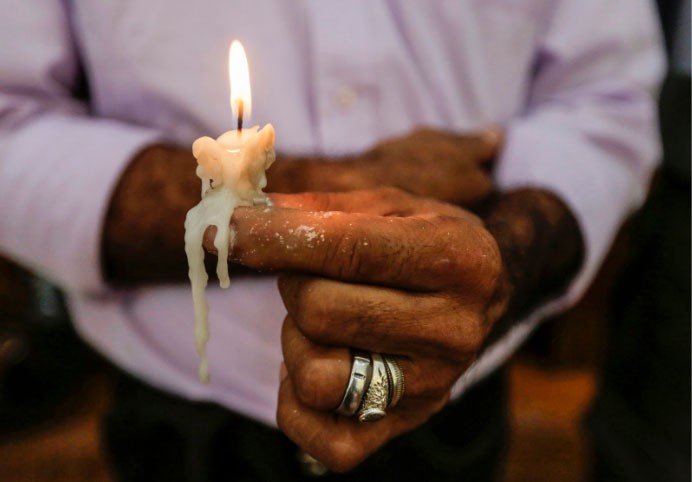- What We Do
- Agriculture and Food Security
- Democracy, Human Rights and Governance
- Democracy, Human Rights and Governance Strategy
- Supporting Free and Fair Elections
- Supporting Vibrant Civil Society & Independent Media
- Protecting Human Rights
- Promoting Accountability & Transparency
- Importance of Democracy, Human Rights, & Governance to Development
- COVID-19: Issues and Potential USAID Responses
- Countering Trafficking in Persons
- Global Labor Program
- Religious Freedom
- Youth Impact
- Economic Growth and Trade
- Education
- Environment and Global Climate Change
- Gender Equality and Women's Empowerment
- Global Health
- Humanitarian Assistance
- Transformation at USAID
- Water and Sanitation
- Working in Crises and Conflict
- U.S. Global Development Lab
Speeches Shim

The free exercise of religion is a source of personal and national stability, and its preservation is essential to protecting human dignity. Religious diversity strengthens our communities and promotes tolerance, respect, understanding, and equality. Faith breathes life and hope into our world. We must diligently guard, preserve, and cherish this unalienable right. - President Donald J. Trump, 1/16/2018
USAID places a strong emphasis on the rights of religious minorities and aims to protect and vigorously promote religious liberty. Today, there is an increase in threats to the freedom of religion, particularly for minority groups. Freedom of religion and the right to publicly and privately manifest religious beliefs in teaching, practice, worship and observance are core human rights. International law also protects people from being compelled to practice a specific religion or prevented from changing their religion. The rights of people to practice their religion are also closely tied to the rights of expression, assembly, association, and freedom from discrimination.
USAID’s support for advancing democracy includes a focus on promoting and protecting the foundational rights embodied in the US Constitution and law, including religious liberty and freedom from discrimination. This includes assistance to protect religious minorities from persecution and atrocities.
This focus also contributes to increasing national security, as we have seen that across the globe, discrimination along religious lines, majoritarianism, or even heavy-handed secularism can be a push factor for radicalization, and sow divisions that lead to conflict. USAID programs are supporting religious freedom and challenging religious discrimination.
- USAID/Indonesia supported strategic litigation efforts by local civil society groups that led to the Constitutional Court’s landmark decision in 2017 to recognize indigenous faiths beyond the “official religions” enshrined in the 1965 Blasphemy Law. The court’s decision will allow religious minorities to list their faiths on their national identity cards, without which, there were often problems registering marriages, obtaining birth certificates, or qualifying for health benefits, among others. USAID assistance helped 9 of the 18 lawyers who provided amicus briefings in the case, largely focused on religious freedom principles, which shaped the favorable ruling.
- USAID/Georgia has provided support for legal aid clinics that have helped religious minority groups use litigation to overturn discriminatory practices. For example, when construction permits filed on behalf of religious organizations were held up pending permission from the State Agency on Religious Affairs, the plaintiffs challenged that decision and the court found that practice discriminatory.
- In the Central African Republic, USAID worked with religious community leaders and disaffected youth to peacefully manage inter–group tensions and rebuild community cohesion. It also supported positive media messaging and efforts to increase participation of young Christian and Muslim women and men in peacebuilding.
In most of the world, religious communities often represent an outsized component of a country’s civil society in terms of membership, influence, and reach across multiple demographics. Aside from their function as institutions of worship, religious organizations play a range of public roles that can be essential to the advancement of democracy, human rights, and good governance.
USAID’s Office of Faith Based and Community Initiatives is also an active supporter of the The International Partnership on Religion and Sustainable Development (PaRD), established in February 2016 at the Berlin conference “Partners for Change – Religions and the 2030 Agenda.” It brings together members and partners from all over the world in order to harness the positive impact of religion and values in sustainable development and humanitarian assistance. Membership of PaRD is voluntary and open to all governmental and intergovernmental entities. Partners are civil society and non-governmental organisations such as religious and value-driven organisations, secular NGOs, community initiatives, foundations, academic institutions and other relevant development organisations.
RESOURCES:
- USAID’s Field Guide: Helping Prevent Mass Atrocities. DRG’s Human Rights team focuses on reducing risks for mass atrocities and views infringement on religious freedom as a key indicator of risk. This tool describes the key concepts, policies and programmatic tools related to prevention and response.
- USAID CMM Toolkit on Religion, Conflict and Peacebuilding. This toolkit addresses the link between religion and conflict and religion and peacebuilding, explains why and how development practitioners should address religion more directly, and provides lessons learned for development assistance in religious contexts.
Religious freedom is one of our core values, and has critical links with USAID’s development efforts and assistance. USAID is excited to announce the new online training, "Promoting Religious Freedom," designed to give all our staff the information and tools to understand and advance religious freedom in our work. This 45- to 60-minute, self-paced module defines international religious freedom, outlines common restrictions and violations on freedom of worship, and highlights other human rights deeply connected and necessary to support religious freedom. It also explains relevant U.S. Government policies, laws, and institutions that support our efforts to promote religious freedom. This training reinforces the high priority USAID places on promoting religious freedom, and will allow USAID to meet the requirement that all Foreign Service Officers (FSOs) receive training on religious freedom, pursuant to Public Law 114-281, “The Frank R. Wolf International Religious Freedom Act.

Comment
Make a general inquiry or suggest an improvement.